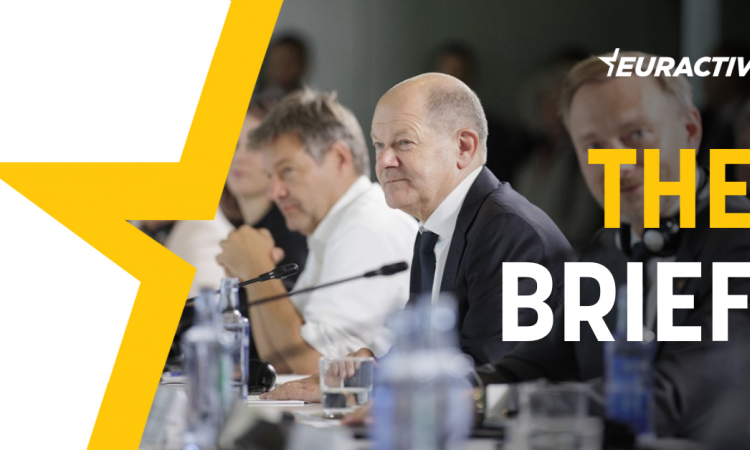
German economic thinking has gone through a shift. Once a fierce advocate of restraint regarding subsidies and industrial policy, Berlin is looking at how to adapt to new market realities following the US Inflation Reduction Act (IRA).
However, the highly-anticipated response to the US initiative must take the form of a joint European effort – or it will fail.
As the EU mulls how to the IRA, which incentivises industries to relocate across the Atlantic, one concern is resonating louder than the others: In the European scheme of things, Germany could disproportionately benefit from any option to grant national subsidies.
Taking a step back from the current discussion, this is actually quite surprising.
For decades, German economic thinking was driven by the importance of free market forces and restraint when it comes to government interference.
Hence, on the international stage, Germany advocated a “rules-based order” where other governments, too, commit to refraining from economic interference. Ideally, globally, at the World Trade Organisation (WTO), or at least within the European single market.
For a long time, this approach had the advantage of equality, benefitting the German export-oriented industries by opening up markets for German cars and machinery and being in line with Germany’s dominant “ordoliberal” economic dogma.
So great was the belief in efficient global markets that Germany allowed large parts of its once-large solar and wind industries to close down when they could no longer keep up with increasing Chinese competition – a fact that makes Ursula von der Leyen’s plans to rebuild a solar and wind industry in Europe seem about 10 years too late.
But with the US passing its €500 billion heavy IRA, Germany, too, is increasingly wary that this cannot be left unanswered.
Despite saying it does not want a “subsidy race” with the US, Germany joined a call with France last December to “match” US subsidies with their own programmes.
At the same time, however, Germany has not completely waved goodbye to its decades-old economic doctrine. With austerity and aversion towards joint borrowing still running deep in the German DNA, it seems to think that this new push for a more active industrial policy in Europe can be satisfied on the national, rather than European, level.
But you can’t have the cake and eat it too. As it is now, the EU is not built to compete in an increasingly protectionist world.
With only a small budget, and strict rules on how member states can support sectors of economic priority, Europe might be able to preserve a level playing field within the single market – but not to adequately keep up with other blocs’ strategic investment decisions.
While the German government is betting on more subsidies on the national level, it simultaneously likes to preach fiscal restraint to other countries – so they can comply with the EU’s debt rules that Germany wants to bend as little as possible.
At the same time, it rejects any call for joint European borrowing, something that the second and third-biggest economies, France and Italy, see as a precondition for changes to national subsidy rules.
Hence, Germany is at a crossroads.
If it wants to give in to the new reality and play the subsidy game – to prevent large parts of its industry from leaving the country and investing elsewhere, including in those technologies that allow for a climate-neutral lifestyle – it has to do so wholeheartedly.
Thoughts of a German Alleingang (going alone) understandably trigger fears all over Europe. Let us hope for a joint European approach.
The Roundup
Twitter is facing a lawsuit in Germany over its non-removal of antisemitic content, in a case that could have broader implications for users’ ability to ensure the enforcement of platforms’ terms and conditions.
Freelance interpreters in Belgium are organising to demand fair pay and improved working conditions against language service providers, building on the new European Commission’s guidelines, which allow individual self-employed workers to organise and negotiate collectively.
Stockholm put forth a new compromise on the Data Act, obtained by EURACTIV, touching on scope, trade secrets, business-to-government (B2G) data access, international transfers, and compensation, among other things.
As public opinion turns against polluting industries and lawmakers mull increasingly punitive green taxes, shifting to low-carbon flying will safeguard the economic success of the aviation sector, Rome’s airport chief has said.
A petition led by citizens and NGOs calling for a ban on synthetic pesticides left a bittersweet taste after being delivered to the European Parliament in a ‘lively panel’ joined by the Commission, agriculture and environment lawmakers.
The UK government has allowed the emergency use of banned bee-toxic neonicotinoid pesticides in England for the third year in a row just days after the EU ruled out the practice.
Don’t forget to check out our Health Brief for a roundup of weekly news on healthcare in Europe.
Look out for…
- Commemoration of the International Holocaust Remembrance Day on Thursday.
- President of the European Commission Ursula von der Leyen participates in the European Parliament plenary session dedicated to the International Holocaust Remembrance Day.
- Vice-President of the European Commission Frans Timmermans prepares the 2023 UN Climate Change Conference (COP 28) and meets with national authorities and stakeholders.
- European Commissioner for Agriculture Janusz Wojciechowski receives Minister of Agriculture and Food Industry Vladimir Bolea in Moldova.
- Informal Justice and Home Affairs Council meeting on Thursday.
[Edited by Zoran Radosavljevic/Alice Taylor]






